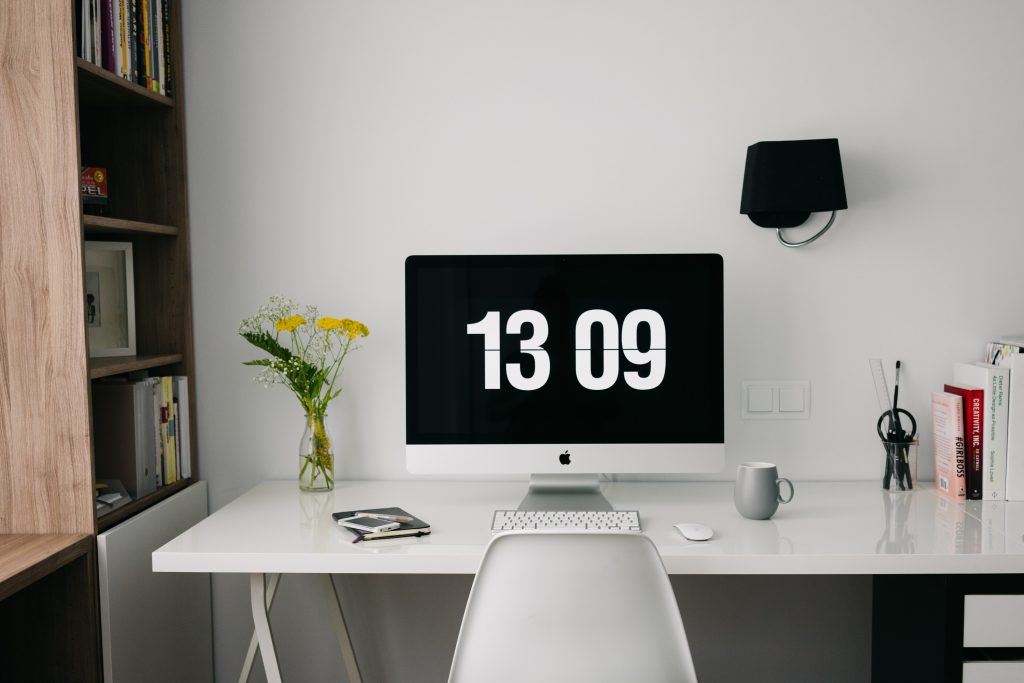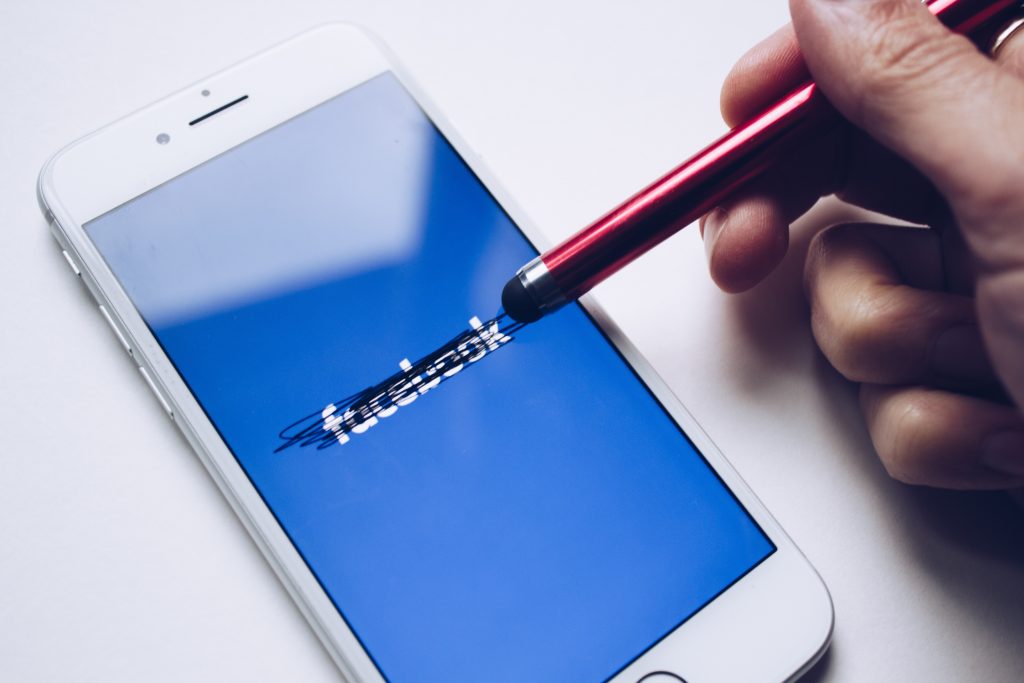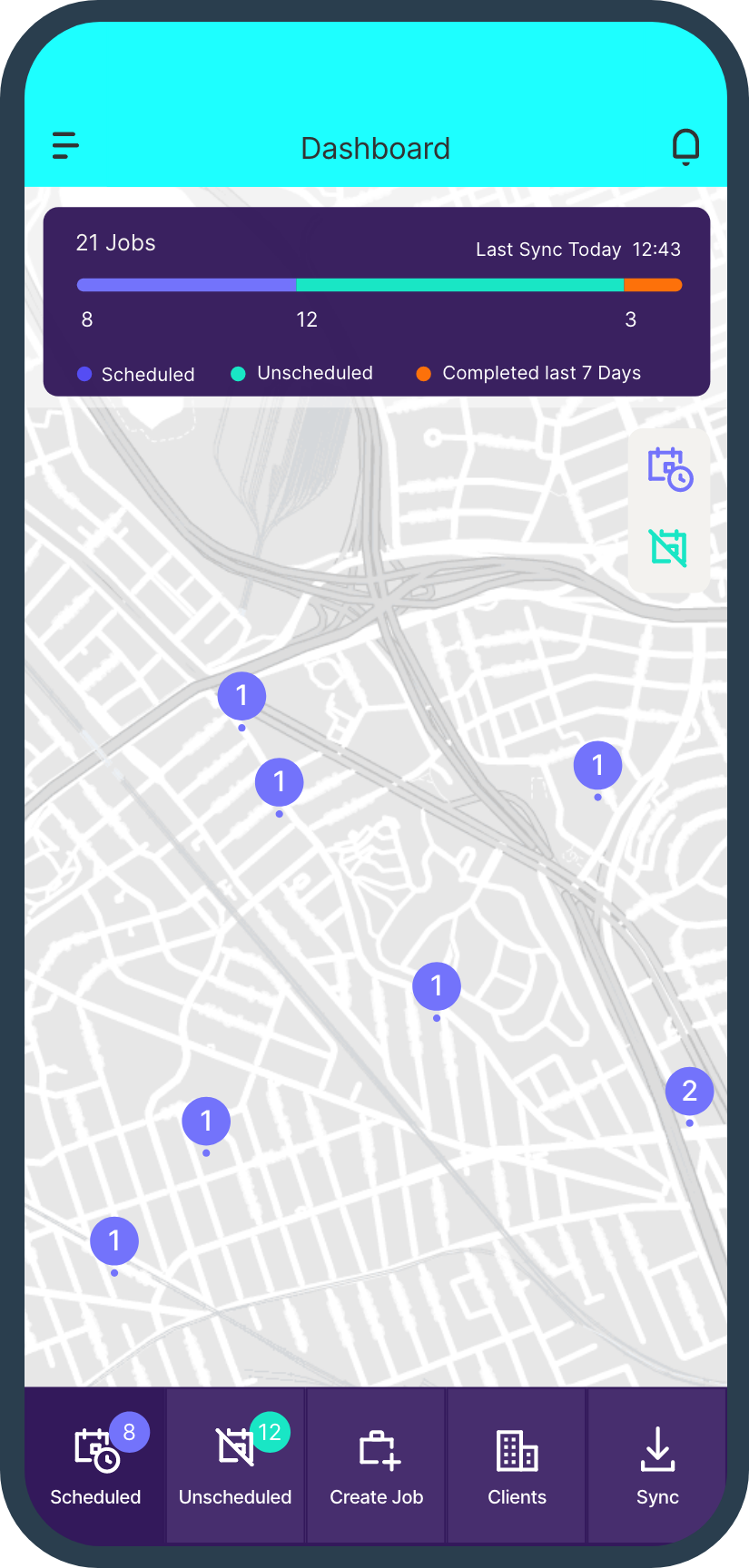Time is a precious resource for your business. It pays to remove distractions and stay focused on your tasks so you’re able to get more out of each day. Being productive can be very rewarding but that shouldn’t mean working more hours, here’s 10 tips on how to get rid of distractions and help you focus at work.
10 Tips for getting rid of distractions and staying focused
Whether you’re working in the office or a field based role, there are some simple steps you can take that will help you stay focused on what you need to do.

1. Get up!
Apple CEO Tim Cook starts his day at 3:45 am.
Yes, that’s a little extreme but there’s a trend among high performing, successful people and that’s to rise early. There’s a good reason too and it’s not just making lots of money, it’s a biological one. Your body sets itself a sleep/wake cycle and these cycles are triggered by chemicals in your brain. A healthy sleep pattern will produce chemicals that encourages the feeling of being alert and when you do wake they allow you to be more productive throughout the day.
If you want to be a happier more productive person it all starts with when you get up. Waking up early sets the tone for how you can plan out your day, improves your mental wellbeing and establishes how much time you can spend between work and family commitments.
You don’t need to be a CEO of a billion dollar business to benefit from an early start. Maybe not 3:45am though!

2. If your don’t have a workspace, create one.
Try to avoid working in spaces shared by others. If you’re working from home and it’s possible you can work from a separate room from your family or housemates, then doing so will limit background noise and distractions.
If there’s one room in the house that you should avoid working in it’s the bedroom. Defining a clear boundary between your work and your home life will help your sleep patterns and well being. Some people don’t have the luxury of space or separate rooms to work out of in their home. This can be challenging but if you are in this situation and you can work from a laptop and your phone, try to break up your week by using hybrid working spaces.
Over the last couple of years there has been a significant demand for temporary office space, used safely by multiple businesses at a time. These can help create an environment, removed from distractions you may get at home and helps you focus. If you work in the field or at a customer’s location then try to make sure you have a space you can use for your admin, report writing or conference calls. It needs to be comfortable and practical for your use.
Regardless of how you do it, the goal here is to create a space that’s yours. A place where you can concentrate, feel comfortable and get more done.
3. Plan for tomorrow and do it today
Don’t switch off straight away when your working day is done, you’ve got one more job to do and that’s to plan for tomorrow. Creating a plan for the next day, even if it’s just in a small way such as a simple to-do list, is a great way to start the following day in a more productive manner.
If you work in a role where your tasks are clear then you can benefit from simply making sure you have everything you need for that first job. For example, if you’re servicing a HVAC system tomorrow, then do you have the address, client name, manuals or documents of the asset?
Field Service professionals who use Klipboard can sync their mobile device with their office and have everything they need for the job tomorrow.
If you’re responsible for processing invoices for jobs that have been recently completed, is everything up to date? Are there any last minute amendments you need to consider or emails from the clients you need to brief up on beforehand?
Doing a quick check that you have everything you need for your first tasks of the day will help you start off on the right foot. This isn’t about working into the night. Spend no more than 15 or 20 mins making sure you’re set up tomorrow, it will set the tone for the day and put you in a positive mindset.
4. The 1-3-5 rule
There’s a neat rule you can follow if you’re in a job where you always have plenty of small things to do that build up to a large workload. The 1-3-5 rule can help you find the balance of completing a to-do list and still ensure you get the important larger things done.
You start by ranking your tasks. Split them up into Large, Medium, Small depending on how long they will take you to complete. The 1-3-5 rule helps you plan out your day so you can complete at least 1 Large task, 3 Medium tasks and then your left with 5 Small tasks.
Obviously you need to be flexible, some larger tasks can’t be completed until a small one is completed first. Think of this rule as a way of shifting your focus to concentrate on getting at least one large, more important task completed each day and build from that.
This also helps when you’re working on a large task that will take several days, as it allows you to focus on that task but consider some of the smaller tasks too. These smaller jobs can be completed as the day progresses without losing sight of your overall larger obligations.
Finishing a day while completing lots of small tasks can make you feel busy, but it’s the larger more impactful jobs that will fill you with a sense of accomplishment.

5. Switch off social media
Social media is a distraction. At it’s best it can make you laugh or connect you closer to someone. At its worst social media will make you feel anxious and a little stressed. Unless your job is a Social Media Manager, limiting the usage of social media while you work will significantly remove distractions from your day.
Americans spent on average more than 1,300 hours each on social media last year. That’s a huge time sink that would be better spent on more productive activities. The good news is it’s easy to switch off social media. You can go full nuclear and delete the apps from your smartphone or just mute their notifications.
Here’s a good article on some ways you can go on a social media detox. Learn more.
Reducing your smartphone screen time on social media will make you a happier, more productive person and help you focus on what you need to do.
6. Take a break. Take a walk.
The most obvious benefit of taking regular breaks is reducing fatigue. However, the headspace a break affords you could be just what you need to refocus your mind.
Engineers are problem solvers by their nature. Taking breaks from their tasks are a great way for them to consider new approaches to a problem or discovering a fix. That same mindset works no matter what your role. If you can, taking a walk is a great way to de-stress and refocus the mind. Many people don’t find time in their day for exercise, so finding time in their working day to go for a walk will help produce a positive sense of well-being and re-energise you.
Taking breaks can reduce stress and help you perform at a consistent level throughout the day. Without breaks you are likely to make mistakes which is counter-productive and may cost you or other members of your team more time.

7. Encourage accountability
Accountability is a great way to ensure you stay focused on your goals. When everyone is working towards the same goals it certainly creates forward momentum but accountability will ensure the important things get done.
With a more general approach there could be a perception that someone will pick up the slack or that certain high performing team members will do the work. Encouraging accountability with individuals gives them a personal sense of responsibility and can be very rewarding for them when the work is completed and appreciated.
The key here is appreciating the effort. Make sure there’s processes in place to ensure jobs are discussed across the business. Sharing feedback from the client is a great way to instigate these communications around the business.
This is particularly true if your team is predominantly working remotely from home or at your customers locations. Sharing feedback around the team for a job well done, creates positive momentum and ensures good work stands out.

8. Make sure each video call has a purpose
While you’re working remotely it’s tempting to want to chat a little longer when on a video call. This is especially true if you’re doing a video call with your colleagues and people you have a good rapport with.
By highlighting at the start of a call what specifically you want to cover and each point of an agenda you’re establishing a clear indication when the meeting will be over.
Give the meeting a clear time restriction. Some businesses have implemented a rule of ‘no Zoom calls lasting longer than 30 minutes’. Obviously some projects or discussions may require longer but they are the exception and not the rule. There’s no harm in asking how the family is after you’ve covered what you need to for a few minutes, but at least all those involved in the call know you’ve addressed what you need to and can step away from the call promptly.
This will mean that video calls won’t last longer than they need to and it ensures the call won’t end with loose ends needing follow ups.

9. Ensure your team knows when you need to focus
If you are responsible for other members or you’re typically the person people go to for advice then your own colleagues can be a big distraction. For some, it’s very rewarding helping others achieve their goals or complete tasks but often you’ll have to do it at the expense of being able to do your own work.
If you communicate with your team and let me know you need a particular afternoon to finish something important, or suggest to them to send an email to you rather than a call if it’s not urgent, you’ll be able to focus on your own tasks and your team won’t stop your progress.
Try to suppress the natural urge to help them and help yourself instead!

10. Get enough sleep
We’ve come full circle. Tip number one was getting up early, the last tip in our Top 10 is getting enough sleep. The benefits of a healthy sleep pattern have been well documented. Fewer sick days, improved mental wellbeing and reduced risk of heart disease have all been attributed to getting enough sleep.
Your ability to be creative and concentrate on your job is directly affected by how much sleep you get. The average adult needs around 7-8 hours sleep a day and consistency is important. Keeping to a regular sleep cycle will ensure you remain a fit, healthy and productive team member.

The cost of human error in field service
The average salary of a Field Service engineer is around $68,000 per year in the United States according to recruitment website Indeed.
The cost of re-writing a report or having to re-do data entry even just for an hour will cost a Field Service business around $25 per person. Apart from the obvious monetary impact this makes on organisations there are serious safety concerns when it comes to lapses in concentration and being distracted. Field Service roles are often carried out with strict safety measures for good reason. Engineers and Technicians might be asked to carry out their duties at height or in hazardous environments.
Removing distractions and ensuring your team is focused will not only save your business money by removing the need for duplicating tasks or the time correcting mistakes, but also ensure your team remains safe and healthy.


